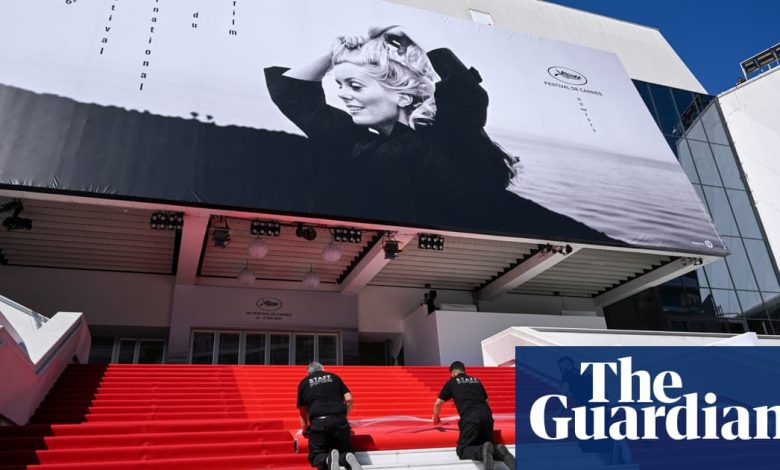Cannes film festival faces strike disruption over seasonal workers’ rights | Cannes film festival

[ad_1]
The Cannes Film Festival faces strike action at its opening next week and could see protests from projectionists, floor managers and press agents demanding changes to the French government’s treatment of staff at the seasonal film festival.
The French Côte d’Azur festival had only faced a major strike once before during the student protests and labor strikes that began in May 1968.
This year, a collective called Sous les Écrans la Dèche (The Poverty Behind the Screens), which represents more than 200 workers, has called a strike over the government’s treatment of freelancers at festivals in France. These include projectionists, programmers, cashiers, logistics managers, floor managers, drivers, decorators and press officers.
The collective said the government’s latest proposed changes to unemployment laws would make it impossible for many skilled film festival workers to make ends meet. Workers are hired on short-term, seasonal contracts at film festivals in France. But they do not fall under France’s special unemployment insurance scheme for freelancers, artists and technicians in the cultural sector. This scheme raises wages up to the minimum wage, providing government support during periods of unemployment.
The collective said that changes to the French unemployment system, which will be introduced at the beginning of July, will put seasonal workers at film festivals in an even more difficult position, with a higher threshold for claiming unemployment benefits.
A spokesman for the collective said: “One by one we will have to give up our professions, which will put at risk those film festivals which are already saying it is difficult to find staff.”
They added: “The strike will not put the Cannes opening at risk, but there may be disruption during the festival.”
The collective is demanding a meeting during the first week of the festival with key officials in Cannes along with representatives of the Ministry of Economy. She wants the government to commit to drawing up specific plans to protect festival workers.
The Cannes Film Festival said it recognized the “difficulties” faced by some officials and encouraged all parties to “come around the negotiating table.”
Meanwhile, there are fears that as the new #MeToo movement in French cinema gathers momentum, the festival could be affected if the French media publish new sexual harassment revelations during the event.
Said Iris Knobloch, the president of Cannes Paris match that the festival is “extremely attentive” to the #MeToo movement and is “monitoring the situation closely”. She said that if anyone involved in presenting a film at the festival is the subject of allegations, “we will ensure that the right decision is made, on a case-by-case basis, in consultation with our governing body and the various parties involved.” But she said the film shown would also be taken into consideration as “the work is the real star”.
after the promotion of the newsletter
A short film by the actor, writer and director will premiere in Cannes next week Judith Godrech titled Moi Aussior Me Too, highlighting the stories of sexual assault survivors.
Godrèche has become a leading voice in France #MeToo movement after she accused directors Benoit Jacquot and Jacques Duillon of sexually abusing her when she was a teenager. Both men have denied the allegations. The prosecutor’s office has launched an investigation.
Godrech spoke at this year’s French César film awards and in parliament, calling for an end to sexual violence in what she described as the “incestuous” French film industry.
Gerard Depardieuone of France’s most famous actors, will face a criminal trial in October for allegedly sexually assaulting two women on the set of a 2021 film. He is also under official investigation in another case after actor Charlotte Arnold claimed that he raped him at his home in Paris in 2018. He denied all the accusations.
[ad_2]




